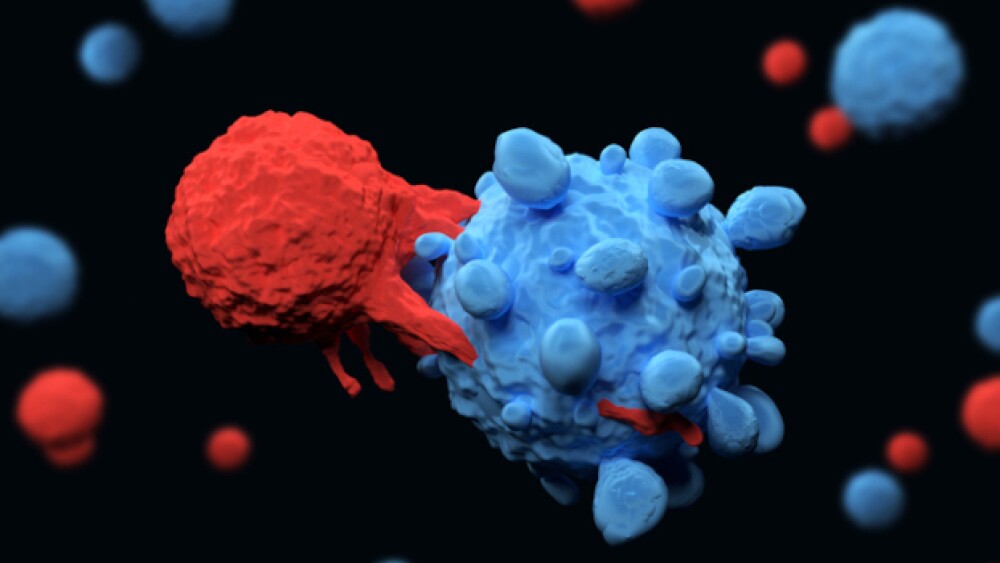The gene editing company is dropping two programs and favoring its next-generation assets CTX112 and CTX131, which it will continue to develop in oncology but will also test in autoimmune diseases.
Pictured: 3D illustration of a T cell attacking a cancer cell/iStock, Meletios Verras
Days before the FDA is set to issue its decision on the gene-edited sickle cell disease therapy exa-cel, CRISPR Therapeutics announced Monday that the company is dropping two programs from its portfolio and expanding in a new indication.
Monday’s pipeline reprioritization will see the Swiss biopharma move away from its first-generation allogeneic CAR-T assets CTX110 and CTX130 and pivot toward its next-generation candidates CTX112 and CTX131, which could potentially have “higher CAR-T cell expansion and functional persistence,” according to the company’s announcement.
Patients on CTX110 and CTX130 will be transitioned to long-term follow-up programs where applicable, CRISPR noted.
CTX112 like CTX110 is an investigational allogeneic CAR-T therapy that targets CD19, an antigen central to B cell maturation and is typically highly expressed in B cell malignancies. Meanwhile, CTX131 like CTX130 targets the CD70 antigen, which is expressed in several solid tumors and hematologic cancers.
The next-generation candidates carry two new additional gene edits—knock-out of both Regnase-1 and TGFBR2—which together boost their CAR-T potency and lower CAR-T exhaustion. In preclinical studies, these two edits work to synergistically improve the potency of CTX112 and CTX131 approximately tenfold relative to their respective first-generation counterparts, according to the company.
CRISPR has an ongoing Phase I/II study of CTX112 in relapsed or refractory B-cell malignancies, while CTX131 is currently in a Phase I/II trial for relapsed or refractory solid tumors.
“We are very encouraged by the progress and early clinical data from our next-generation candidates,” CRISPR Chief Medical Officer PK Morrow said in a statement, adding that while the company already documented benefits associated with consolidated CTX110 dosing, CTX112 “could result in even better outcomes for patients.”
By focusing CRISPR’s time and resources on these next-generation and “potentially best-in-class” assets, the company will usher them through the clinic and bring them to patients “more efficiently and rapidly,” CEO Samarth Kulkarni said in a statement.
Besides reprioritizing its CAR-T pipeline, CRISPR will also push CTX112 and CTX131 into a new indication, testing their therapeutic potential in autoimmune diseases. This effort includes a trial in systemic lupus erythematosus, which the biotech is preparing to launch in the first half of 2024.
Monday’s pipeline changes come as CRISPR awaits the FDA’s decision for the Vertex Pharmaceuticals-partnered exagamglogene autotemcel (exa-cel), being proposed for the treatment of sickle cell disease. The regulator’s deadline is Dec. 8.
The odds are in CRISPR and Vertex’s favor. In late October 2023, the FDA’s Cellular, Tissue, and Gene Therapies Advisory Committee sided with the companies, agreeing that they had sufficiently established the safety of the gene-edited candidate. A few weeks later, the U.K.’s Medicines and Healthcare products Regulatory Agency granted conditional marketing authorization to exa-cel.
Tristan Manalac is an independent science writer based in Metro Manila, Philippines. He can be reached at tristan@tristanmanalac.com or tristan.manalac@biospace.com.






